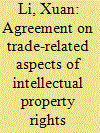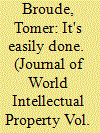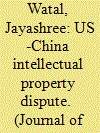| Srl | Item |
| 1 |
ID:
099169


|
|
|
|
|
| Publication |
2010.
|
| Summary/Abstract |
Criminal procedure is one of the three major points in the China-Intellectual Property (IP) case brought about by the United States. A number of experts believed that United States failed on this point because of lack of sufficient evidence. However, the author is of the view that the Agreement on Trade-Related Aspects of Intellectual Property Rights (TRIPS) text-based interpretation of IP enforcement flexibility served as the core of the panel decision. This article starts with the criminal thresholds of China's criminal laws, and focuses on analysing the interpretation by the panel on the scope of responsibility and its limitations as enshrined in article 61, which led to the conclusion that the essence of the dispute is how to interpret and determine "IP enforcement flexibility". On this basis, the article expounds the concept and content of the "IP enforcement flexibility" and highlights the implications of this concept on current international TRIPS-plus initiatives. Some implications are given on how the World Trade Organization members can take advantage of the enforcement flexibility to serve the needs of innovation and development in their own countries.
|
|
|
|
|
|
|
|
|
|
|
|
|
|
|
|
| 2 |
ID:
099168


|
|
|
|
|
| Publication |
2010.
|
| Summary/Abstract |
One of the ground-breaking features of the World Trade Organization (WTO) Agreement on Trade-Related Aspects of Intellectual Property Rights (TRIPS) is its part III on the enforcement of intellectual property (IP) rights. In early 2009, the first WTO Dispute Settlement Panel Report primarily addressed obligations on IP enforcement. Here, the technical success of the US border measures claim comes with a crucial limitation: those Chinese measures that cover basically all of the commercially relevant activity are ab initio excluded from the panel's findings. Because they go beyond the minimum standards of TRIPS, the panel relied on one of the few TRIPS provisions that specify the relevance of TRIPS for additional "TRIPS-Plus" IP protection and enforcement. Given that such "TRIPS-Plus" measures are increasingly common in national laws and international treaties, it is time to take a closer look at how TRIPS addresses TRIPS-Plus IP protection. With a focus on border measures, I conclude that TRIPS contains not only minimum but also maximum standards or "ceilings" that impose limits on additional IP protection and enforcement. Such ceilings in TRIPS can function as limits for further extensions of IP protection and enforcement-as currently negotiated under a proposed Anti-Counterfeiting Trade Agreement or relating to border measures against generic drugs in transit.
|
|
|
|
|
|
|
|
|
|
|
|
|
|
|
|
| 3 |
ID:
099170


|
|
|
|
|
| Publication |
2010.
|
| Summary/Abstract |
This article examines the implications of the World Trade Organization (WTO) China-Intellectual Property Rights Enforcement case for the relationship between human rights law and trade-related intellectual property law. It shows that, despite the theory whereby international trade law can spontaneously support the freedom of expression and possibly other human rights, the parties and the panel were, in practice, oblivious to the human rights context of the dispute. In the WTO, human rights considerations will be integrated with international trade law (and intellectual property law within it) only if a party makes explicit arguments to this effect, and a panel opts to consider such arguments on their merits, not through issue avoidance.
|
|
|
|
|
|
|
|
|
|
|
|
|
|
|
|
| 4 |
ID:
099167


|
|
|
|
|
| Publication |
2010.
|
| Summary/Abstract |
This article focuses on the significance of the US-China intellectual property panel report in terms of the light it shed on the interpretation of certain provisions on domestic enforcement contained in part III of the Agreement on Trade-Related Aspects of Intellectual Property Rights (TRIPS). The panel made several important observations in respect of certain TRIPS domestic enforcement provisions either reinforcing views previously held, adding further meaning or shedding new light on these provisions, explaining its reasoning, and including, on several occasions, an examination of the negotiating history of TRIPS. This article picks out certain key points of interpretation by way of illustrating the significant contribution made by the panel to TRIPS jurisprudence.
|
|
|
|
|
|
|
|
|
|
|
|
|
|
|
|